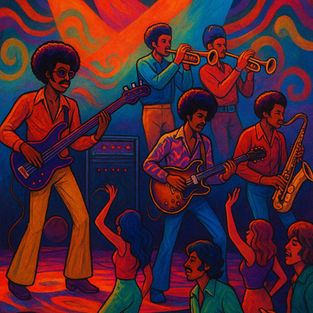
Photo- AI Generated
Women in Rock: Breaking Barriers in the 1970s
Women in rock during the 1970s were frontwomen, instrumentalists, and icons carving out a niche in a male-dominated business, influencing the future of music.
18 February 2026
The 1970s were a watershed point in the history of rock music. While male performers dominated the genre in the 1950s and 1960s, the new decade saw the rise of powerful female voices that smashed stereotypes and forever altered the sound and spirit of rock.
The social and cultural backdrop
The rise of women in rock in the 1970s was inextricably linked to societal changes. The women's liberation movement gained traction, advocating for equality in all aspects of life, including the arts. Rock music, which is frequently connected with rebellion and self-expression, provided the ideal platform for women to express their frustrations, desires, and individuality. Against the backdrop of second-wave feminism, female rock musicians aspired to be recognised as artists in their own right, rather than just muses or backing vocalists.
Janis Joplin’s legacy
Despite her terrible death in 1970, Janis Joplin's influence remained strong throughout the decade. Joplin, known for her gritty, soulful voice and blues-rock sensibility, defined what women might do in rock music. She demonstrated that emotion, vulnerability, and raw vocal strength could coexist with the loud guitars and pounding percussion of rock. Her spirit motivated numerous female artists of the 1970s to step forward and make their mark.
Heart: Sisters That Rocked
Perhaps no band better epitomised women overcoming barriers in the 1970s than Heart, led by sisters Ann and Nancy Wilson. At a time when female-fronted rock bands were uncommon, Heart generated enormous successes like "Magic Man" and "Barracuda." Ann's powerful vocals and Nancy's superb guitar performance shattered the mould, demonstrating that women could dominate the stage as vocalists and instrumentalists. Their success opened doors for future all-female and female-led bands.
Patti Smith & The Punk Edge
On the opposite end of the rock spectrum, Patti Smith introduced a raw, poetic, and punk-fueled intensity to the scene. Her seminal 1975 album Horses fused rock and poetry, stretching the limits of what rock music might sound like. Smith's androgynous image and intelligent poetry challenged traditional notions of femininity in music, and her influence spread beyond punk, affecting alternative and indie rock for decades.
Stevie Nicks & Fleetwood Mac
Although Fleetwood Mac was a cooperative effort, Stevie Nicks became one of the most recognisable faces and voices in the 1970s rock scene. Nicks reinvented female rock stardom with her mystical stage presence, haunting voice, and immortal songs. Songs like "Rhiannon" and "Dreams" demonstrated her ability to combine rock and storytelling, creating a sense of enchantment and mystery that attracted listeners worldwide. Her success with Fleetwood Mac proved that women could be creative leaders in mixed-gender bands.
Suzi Quatro, The Original Rocker Girl
Suzi Quatro defied stereotypes in a decade when women were rarely seen playing electric bass guitars. Quatro, known for her leather jumpsuits, gritty vocals, and bass-driven sound, was one of the first female rock singers and instrumentalists to attain popularity. Hits like "Can the Can" and "Devil Gate Drive" demonstrated that she was more than just a novelty act; she was a trailblazer who blazed the way for female rockers in the 1980s and after.
Barriers Faced by Female Rockstars
Despite their accomplishments, female rock performers in the 1970s faced numerous hurdles. The profession was riddled with misogyny, sometimes reducing women to their appearance rather than their artistry. Record labels and media outlets were cautious to support female-fronted bands, thinking that they would not sell as well as male performers. Many women had to strive twice as hard for recognition, combating preconceptions while also creating music. However, it was this suffering that made their victories all the more meaningful.
The Long-Term Impact of Women on Music
The importance of women to 1970s music cannot be emphasised. They pushed the genre's boundaries, questioned traditional gender norms, and paved the way for future female performers like Joan Jett, Debbie Harry, Alanis Morissette, and countless others. Their music, flair, and rebellion continue to inspire new generations of rockers, ensuring that the limits they broke are left in the past.
Conclusion
The 1970s were a golden age of rock; it was a decade where women reclaimed their rightful place in the spotlight. From Patti Smith's revolutionary poetry to Heart's arena-shaking songs, Stevie Nicks' mystical lyrics to Suzi Quatro's bass-driven force, women in rock reinvented the genre. They not only changed the sound of the 1970s, but they also left an enduring legacy that still resonates in the music industry today.






